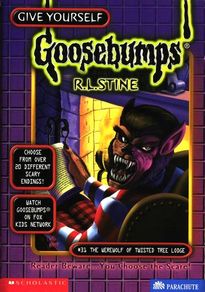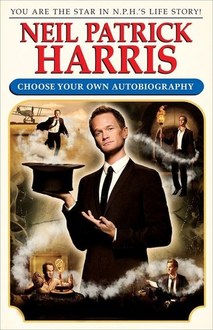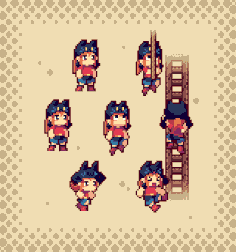 by Justina Addice Imagine this: you’re eight years old, sitting cross-legged on the floor of the children's section of your town’s public library, facing shelves of R.L. Stine's collection of horror novels. You’ve just opened up the cover of Give Yourself Goosebumps: The Werewolf of Twisted Tree Lodge, and upon reading the first words, you are immediately immersed in this second-person narrative where you’re the main character. It begins with a bus ride; you’ve just won first prize for a horror story that you didn’t actually write, and are now on your way to claim your prize, to spend a weekend away at a spooky cabin in the woods… Fast forward thirteen years later to October 2018, where you come across old episodes of Goosebumps on television, and vague snippets of one specific story suddenly appears in your mind—images of traveling to a cabin, being chased by werewolves through a forest, of turning into a werewolf yourself. Others follow that, and you’re suddenly reminded of the wonderful stories you read as a child, ones where you were able to choose the outcome of the plot, where you could relive the same situation over and over with a new ending each time. You scramble to your laptop, and although it takes a while before you can actually find these stories you’ve somehow forgotten, you eventually come across it: Give Yourself Goosebumps. And underneath is a key word describing its genre: gamebook.  Doesn’t sound familiar? You aren’t alone. R.L. Stine's second person, interactive novels are only one of many in this genre, which typically goes by its more commonly used title, "Choose Your Own Adventure" books. Unlike any other genre, this unique way of telling stories through a branching narrative or role-playing style places the reader in the book as the main character, and then presents them with options, as they flip back and forth between pages to experience the story different ways (basically the literary version of role playing video games). For any avid reader, this probably sounds fantastic, so then what happened to the title of “gamebook,” and more importantly, why don’t we hear about these types of books as often as, say, fantasy or thriller? Originally written solely for children, this genre rose to popularity in the 1980’s-1990’s when an author by the name of Edward Packard created a series called “Adventures of You,” which was eventually renamed. It wasn’t actually until other authors published these types of books, though, that the genre of gamebooks was officially coined.  Packard’s series went on to be comprised of a whopping 184 books, leading other authors to dip their pen into this new genre’s ink and try it out for themselves. And as this new and exciting style rose higher and higher in the public eye, it was expanded to include books geared towards adults, such as actor Neil Patrick Harris’s autobiography. With such a wide span of topics and audiences, though, it once again begs the question of why these wildly creative stories have been almost completely removed from our radar. It could be that there is this preconceived notion that gamebooks are only geared towards children, and not many people take them seriously. Or that they aren’t seen as high quality forms of literature like fiction and nonfiction are. Maybe, with the rise of various gaming systems and advances in technology, people decided that they preferred to pick up a controller rather than spending the time staring at words to procure the same results. If I were to guess, though, I would have to say it’s the combination of all of these.  While these books might not be the current “fad,” I find that, for me, these novels bring back childhood memories of when I first realized how much I loved both reading and writing, when I realized just how much creative freedom you could have with writing in order to produce something truly unique to yourself—that there’s a whole world of possibilities at your fingertips. Not only that, but their style was reminiscent of the 8-bit games I played as a child; honestly, this nostalgia is most likely why the genre has branched out to include a broader audience—those who spent their childhood playing on gaming systems such as Atari, Nintendo’s NES, or even the later generation of Gameboy or DS systems, might find a sense of wistful delight in picking up a piece of writing that emulates these games they loved as a child. At least, I know I do. By picking up a book that reflects the conventions of 80’s role-playing video games, it allows for the freedom to place yourself into the narrative and “choose” how the story plays out. I would argue that this is one of the most intriguing features of this genre because it provides the ability for the reader to get as close as possible to being the “author” of the story, without actually picking up a pen themselves. In fact, in our current, modern era of reading, where more and more people are picking up Kindles and ebooks, the gamebook genre is easier than ever to navigate. Through digital versions, the ability to observe how second person point of view is successfully accomplished—a feat that is not often attempted in the first place—can be accessed by the click of a button through links that replace the tediousness of flipping back and forth between pages. Ultimately, what this genre does is bring a really unique aspect to reading that many people seem to overlook; there’s something innately wonderful about bringing the past into the present where the entertainment value of these novels that began back in the 80’s still manages to hold its ground today. And it’s through this nostalgia and the magical lens of childhood that we can be reminded of why we loved reading in the first place.
0 Comments
Leave a Reply. |
Archives
July 2024
Categories
All
|
|
Glassworks is a publication of Rowan University's Master of Arts in Writing 260 Victoria Street • Glassboro, New Jersey 08028 [email protected] |
All Content on this Site (c) 2024 Glassworks
|

 RSS Feed
RSS Feed
